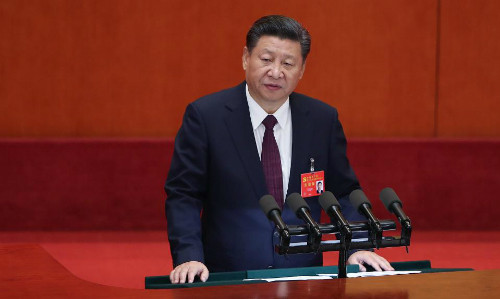China changes its ambition of 'hiding and biding its time'?
Different from Deng Xiaoping's "hidden" philosophy, Mr. Tap wants China to have a big position in the international arena.
 |
Chinese President Xi Jinping speaks at the Party Congress on October 18. Photo: AP. |
China's foreign policy has long been guided by a philosophy put forward by leader Deng Xiaoping in 1990: "Hide your capabilities and bide your time. Maintain a low profile and never take the lead."
Last week, China appeared to have decisively abandoned that three-decade-old policy when President Xi Jinping spoke about his ambition to become the world's leading superpower at the 19th National Congress of the Communist Party of China, according to the FT.
In a nearly 30,000-word speech, Xi stressed that China would no longer shy away from global leadership. “It is time for us to take center stage in the world and make greater contributions to humanity,” Xi said. China “will stand tall and firm in the east,” becoming “the world’s leading superpower by the middle of the 21st century,” he said, referring to his ambition to realize the “Chinese dream.”
"This statement appears to be the official end of Deng Xiaoping's 'hide and seek' philosophy. Deng never said anything like that,"Christopher Johnson, a China expert at the Center for Strategic and International Studies in Washington, assessed.
Xi’s remarks also reflect China’s recent expansion abroad, opening a military base in Djibouti, deploying troops abroad on UN peacekeeping missions and expanding its international aid program.
The Belt and Road Initiative, proposed by Mr. Xi in 2013, is also seen as an opportunity for China to project its "soft power" to large areas of Asia and Africa, while increasing its economic and political influence globally.
China has also made aggressive moves in its sovereignty claims in the East Sea. US Secretary of State Rex Tillerson has criticized China's actions, saying they directly challenge international laws and rules.
In 1990, Deng argued that China must focus on economic development rather than develop by focusing on foreign affairs and excessive military buildup.
However, since taking power in 2012, Mr. Xi has pushed through reforms, modernizing the command structure and investing heavily in modernizing the military. He has set a vision that by 2035, China will have a "world-class" military.
"The military is built to fight. Our military must consider combat readiness as its goal and focus on how to win when called upon," he said.
“These words may cause anxiety for some countries in Asia. Previous speeches about the military have focused on deterrence rather than actual combat,” said Zeng Jinghan, an expert on Chinese politics at Royal Holloway, University of London.
Johnson also found a significant element in the speech: Xi used a phrase used in speeches by previous Chinese leaders. Xi said China was in a "period of strategic opportunity."
Shen Dingli, deputy director of the Institute of International Affairs at Fudan University in Shanghai, said Mr. Xi may be implying that the rise of nationalism and isolationism internationally is creating an opportunity for China to rise.
"The US's inward-looking policy under the Donald Trump administration and Britain's exit from the EU are all reasons for him to use the term 'strategic opportunity,'" Mr. Shen said.
Mr. Zeng said that when Chinese leaders used the phrase over the past 15 years, they were referring to America's wars in the Middle East, the 2008 global financial crisis and the Ukraine crisis.
“As long as the US is distracted by other issues, China sees it as a strategic opportunity,” he said.
According to VNE
| RELATED NEWS |
|---|

